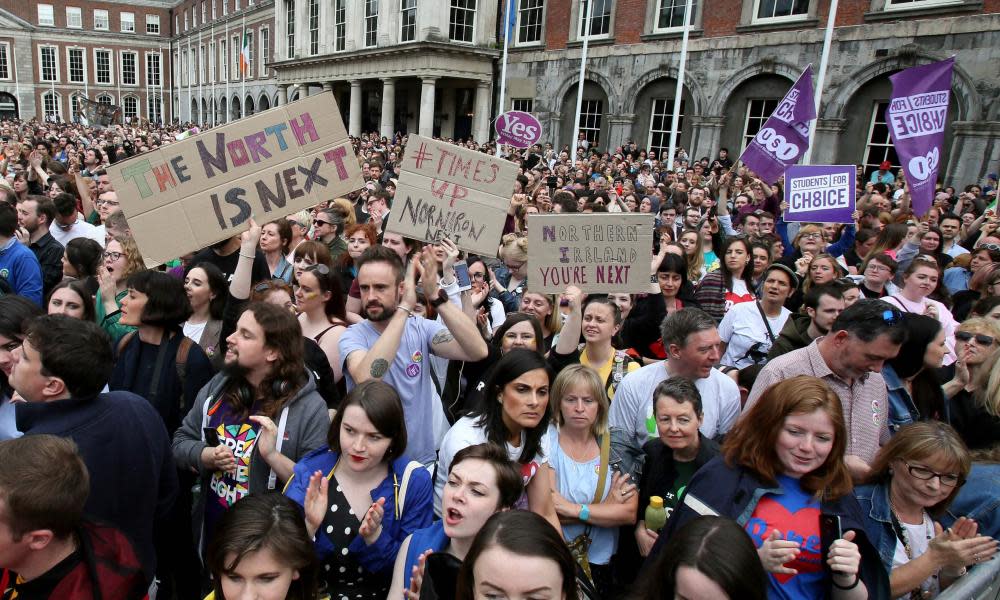Abortion result will throw up challenges for Northern Ireland

Dublin’s Dail will now have to give legislative form to the people of the Irish Republic’s overwhelming decision to repeal the eighth amendment (Ireland votes by landslide to legalise abortion, Report, 26 May, theguardian.com). Belfast’s Stormont will now have to consider what it will do to resolve the fundamental contradiction it faces.
The largest nationalist party, Sinn Féin, supported the yes vote in the Republic so can presumably be expected to be consistent and to support a similar development in the north. The largest loyalist party, the Democratic Unionist party, has always been selective in its loyalty to the United Kingdom. On the one hand, it supports leave against the six counties’ majority for remain because of the UK majority. On the other, it resists the application to the region of the UK’s 1967 Abortion Act despite our joint nation’s absolute majority in support of it.
We, across the whole UK, must now take up the case for the improvement to the 1967 Act, such as the decriminalisation of abortion as the Irish Republic is considering, and the extension of a civilised availability to women of the right to choose to all parts of our nation.
Mary Pimm
London
• Ireland has come of age by voting in such a stunning way to repeal the eighth amendment. However, let’s not forget that true freedom for Irish women has been a very long time coming. In the 1916 Easter Rising, Constance Markievicz fought for gender equality based partly upon her belief in socialist republicanism. She was soon marginalised by other, deeply socially conservative, Irish rebels. They even denied her a state funeral when she died in 1927. After independence, many of the same male revolutionaries who defeated the British empire also colluded with the Catholic church to impose harsh social repression on Irish women. Éamon de Valera famously proclaimed Ireland to be a “Catholic nation”; Catholic doctrine was embedded in the 1937 constitution.
With this overwhelming vote, the Irish people have taken a massive, historic step towards finally making Markievicz’s egalitarian vision for Ireland’s women a reality.
Joe McCarthy
Dublin
• It is a disgrace that in the 21st century women are not comfortably able to choose at which stage in their lives they might prefer to have children – or not. The antiquated underpinnings of centuries of masculine economic dogma mean that women’s choices are subservient to absurd economic compulsions, whereas it should be clear by now that women, as the primary sex, have the greatest creative investment in society. Without them our species would be extinct within a century. Of course women must have the right to choose on abortion. But they are not there to be the slaves of constant economic and social coercion – money, jobs, unemployment, impossible property ladders, mortgages, or the need to be able to “afford” a family, for goodness sake.
Women are needed to recivilise the outmoded thinking of much of our solely masculine outlook. They must be accorded, as of right, not only equal pay and opportunity but, even more importantly and for the first time in history, the voices, insights, powers and attention to shape the principles, institutions, behaviour, practices and assumptions that we are made to live by: generally male-made, frequently archaic, and too often disastrous for many. Women must now be heard as they have never been heard before. Otherwise much of the rubbish will continue.
Ian Flintoff
Oxford
• Join the debate – email guardian.letters@theguardian.com
• Read more Guardian letters – click here to visit gu.com/letters

 Yahoo News
Yahoo News 
